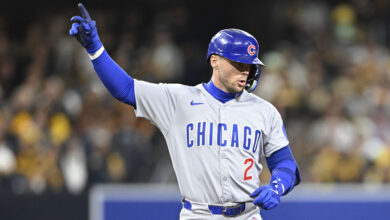Three Years Later, Who Won The Rizzo Trade?
January 6th, 2015 marked the three-year anniversary of the trade that sent bearded fireballer Andrew Cashner from Chicago to San Diego in exchange for slugging first baseman Anthony Rizzo. At the time, many felt it was a reach by the Cubs, a sentimental re-acquisition of a player the with whom the front office had a long history.
Still more saw it as a mutually beneficial swap that served the needs of both teams equally. Now a few years removed, we no longer need to speculate on the future of the deal and can look at what each player has done for his given team.
Putting Rizzo’s recent season into perspective is important in order to really understand what a special player he was for the Cubs in 2014. I looked up the final statistics for guys that qualified as a first baseman in MLB this season. Basically, there were only a little more than 20 that qualify (one of whom was Mark Teixeira), so it wasn’t hard to add up the numbers.
Of those who qualified as first basemen, the average number of home runs hit was 21.6. Rizzo cranked out 32 in only 140 total games, and was only out-homered by Jose Abreu (36) and Edwin Encarnacion (34). Here are some more comparable stats:
League Average Rizzo
Slash Line- .268/.344/.451 .286/.386/.527
wOBA- .349 .397
wRC+- 122 153
WAR- 2.3 5.3
Not only is Rizzo way above average compared to the rest of the first basemen in baseball, he’s basically top three in almost every single category (first in OBP and WAR). Take into account the fact that Rizzo is an above-average defender and you’ve got a superstar player. Did I mention he just turned 25, will make only $5 million next season, and is signed for up to the next seven years?
Rizzo just nudges out Jake Arrieta on the list of “Best Moves Made By Theo/Jed Since Arriving,” in my opinion. But still, Arrieta (and Pedro Strop) was acquired for essentially nothing of future value. Lots of fans like to mention Andrew Cashner and how dominant he’s been for the Padres when he’s on the mound, and that’s true. Since the Cubs traded Cashner for Rizzo, he’s been very good.
Cashner has posted a 3.06 ERA with a 3.28 FIP since the deal during the 2012 off-season, and has pitched consistently with that ace-type stuff that he flashed briefly with the Cubs. But the key phrase here is “when he’s on the mound.” In those three seasons, he’s averaged 115 innings per. This follows his 2011 Cubs season in which he was on the DL basically all year. We don’t know if he’s going to stay healthy from this point forward, but history suggests he’ll probably struggle to stay healthy.
But back to Rizzo, with whom there are also reasons to be concerned going forward. Back issues can be worrisome when they pop up, and Rizzo looks to have added some weight in 2014; as it stands, he was listed at 240 lbs this year. He’s a big dude, though that doesn’t mean he’s fat, out of shape, or has Prince Fielder-esque concerns. I’ve had a back injury, and those of you in the same boat know that once you injure your back, you’re never truly clear of it.
On top of that, it’s possible that 2014 ends up being the best season of Rizzo’s career. And that would be fine, though it’s tough to swallow when a guy has his career year at 24. Rizzo dramatically improved his hitting against left-handed pitchers, and while the approach of waiting back on the ball and taking it the other way suggests he’ll be able to continue to have success, it’s not a sure bet he’ll keep hitting .300/.421/.507 against lefties. He hit .189/.282/.342 against them last year, for example.
But when you break it all down, even if Rizzo regresses a bit against lefties and Cashner pitches a full season without injury, Rizzo still is in the elite group of his position. How many other pitchers in baseball this season put up stats similar to or better than Cashner? As we’ve discussed before, pitching has become easier to find than 30-plus home run hitters that get on base.
This is the classic type of deal where each team gets a good player, and you like the idea that both teams are happy with what they got. If both stay healthy, it’s an easy win-win for each. But so far in the last three seasons, Rizzo has been more healthy and thus the more valuable player. Take his 5.3 WAR this season, for example. Cashner has a 4.3 WAR combined in his three seasons in San Diego. So what’s the verdict so far on this deal?


